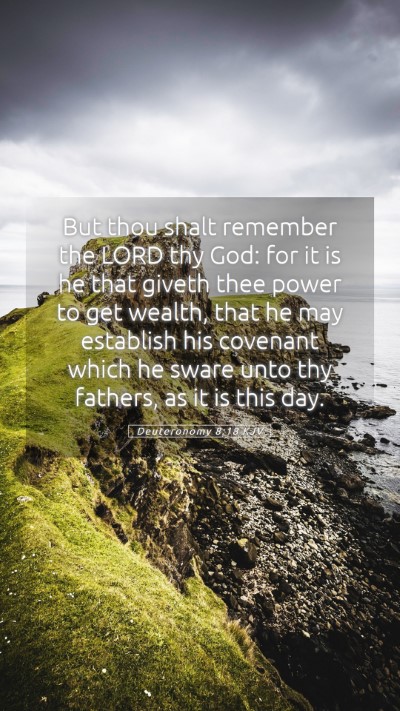Bible Verse Meaning of Deuteronomy 8:18
Deuteronomy 8:18 states: "But thou shalt remember the LORD thy God: for it is he that giveth thee power to get wealth, that he may establish his covenant which he sware unto thy fathers, as it is this day." This verse carries significant implications concerning the relationship between God, prosperity, and the covenant He has with His people.
Summary of Key Insights
- Divine Empowerment: The verse emphasizes that it is God who empowers individuals to acquire wealth. This challenges the notion that success is solely the result of human effort. The commentary by Matthew Henry highlights the importance of acknowledging God's role in our achievements.
- Remembrance of God: It calls for remembrance of the Lord as the source of provision, urging believers to remain grateful and faithful. Albert Barnes notes that forgetting God can lead to pride and a false sense of security in one’s accomplishments.
- Covenantal Relationship: The connection to God’s covenant with the Israelites signifies that prosperity is intertwined with faithfulness to God’s promises. Adam Clarke points out that understanding this covenant is key to recognizing the nature of God’s blessings.
Bible Verse Interpretations
The interpretations of Deuteronomy 8:18 can be multifaceted, reflecting both historical and personal applications. Here are different aspects derived from public domain commentaries:
- Historical Context: The Israelites were on the verge of entering the Promised Land, and the reminder serves to establish a mindset of dependence on God as they faced new challenges.
- Spiritual Reflections: The verse acts as a spiritual admonition for all believers, encouraging them to recognize God's ongoing participation in their lives.
- Practical Application: Today, it serves as a reminder for Christians to integrate their faith with their daily endeavors, acknowledging God in all their successes.
Understanding Scripture
This verse fits into a broader theological framework where material wealth is viewed not as a personal achievement but as a divine blessing for the purpose of fulfilling God's promises to His people. The following points illustrate how it establishes a pattern for Bible study insights:
- Stewardship: Recognizing that one's wealth and resources are ultimately gifts from God encourages responsible stewardship.
- Gratitude: Remembering God's provision fosters a spirit of thankfulness, which is foundational to a vibrant faith life.
- Faithfulness: The acknowledgment of God’s role in prosperity should inspire a deepened commitment to living out the values of the covenant.
Application of the Verse
Analyzing the verse leads to various practical applications:
- Daily Reflection: Individuals can incorporate daily prayers of thanksgiving for their blessings, thus maintaining a practice of acknowledgment of divine support.
- Active Participation: Engaging in Bible study groups or online Bible study platforms can deepen understanding of scripture and God’s promises.
- Community Sharing: Using discovered wealth (in terms of resources or skills) to contribute to community initiatives aligns with the covenant principles.
Related Bible Cross References
- 1 Chronicles 29:12: "Both riches and honor come of thee, and thou reignest over all." This connection reminds readers that all prosperity originates from God.
- Proverbs 10:22: "The blessing of the LORD, it maketh rich, and he addeth no sorrow with it." This passage reinforces the idea that divine blessing leads to true wealth.
- Luke 12:15: "And he said unto them, Take heed, and beware of covetousness: for a man's life consisteth not in the abundance of the things which he possesseth." This serves as a caution against materialism, emphasizing spiritual over material wealth.
Conclusion
Deuteronomy 8:18 serves as a potent reminder for believers to acknowledge God as the source of all blessings, understand their covenant relationship with Him, and act in gratitude and stewardship of His gifts. This verse encourages a profound understanding of Bible verse meanings and offers rich ground for further Bible study analysis and reflection.


